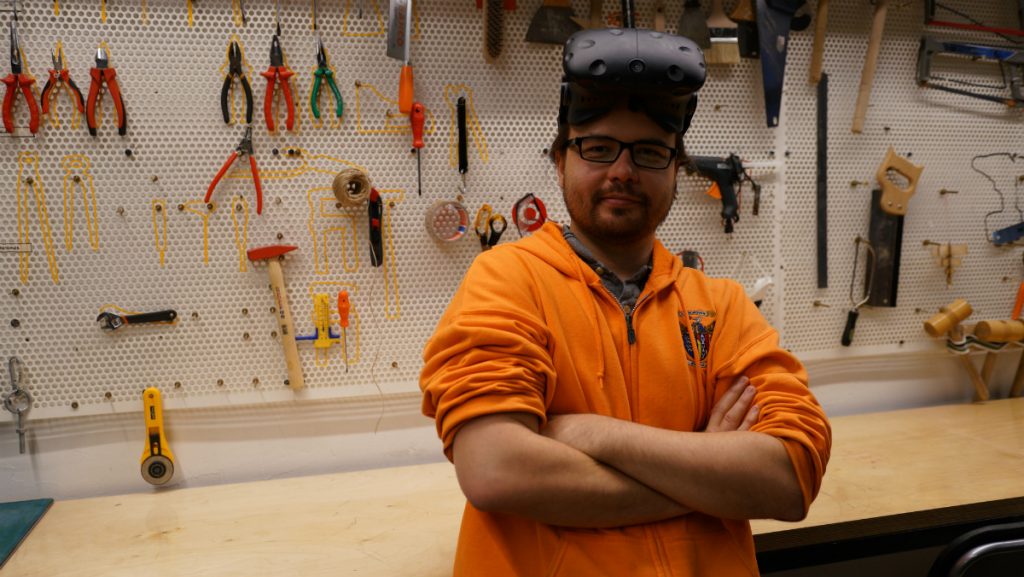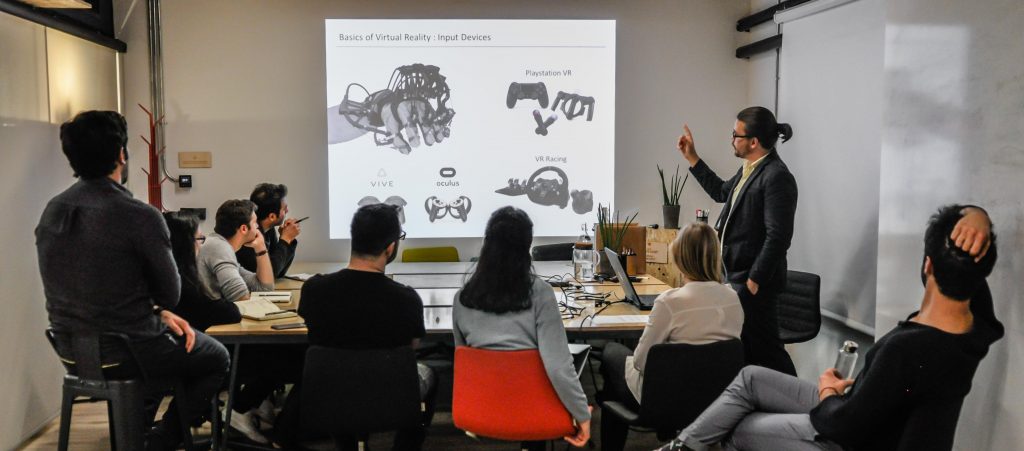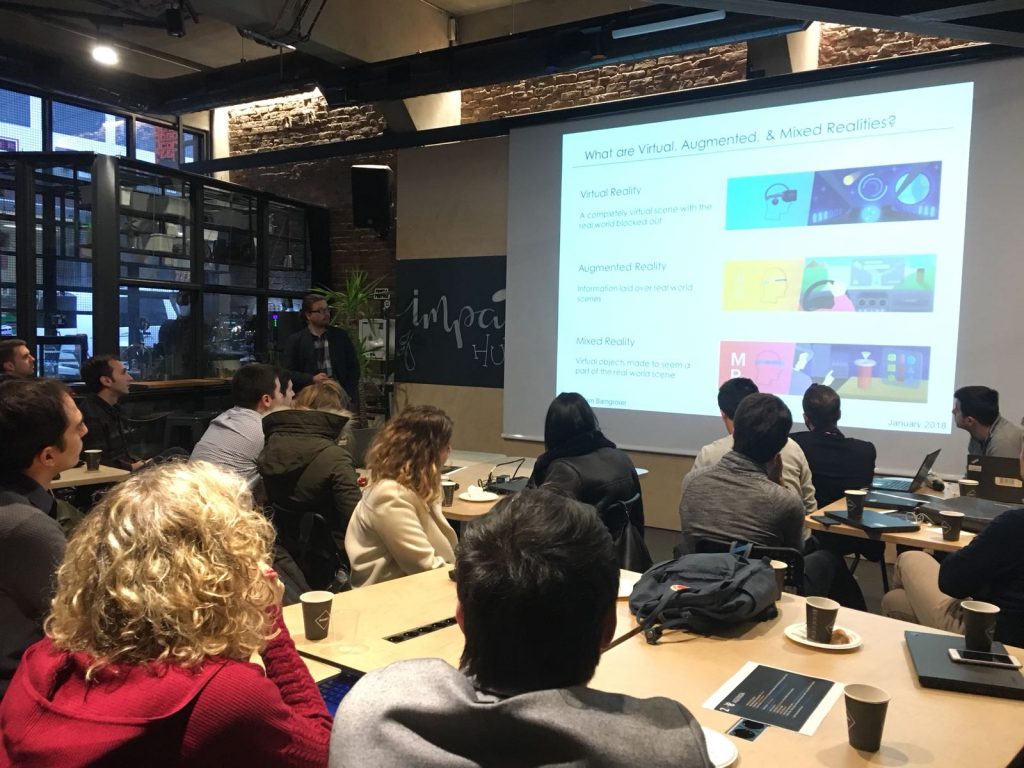A quick chat with most any foreigner living in Istanbul will demonstrate the city’s tendency to attract residents in unique and often random ways. Once settled in, the opportunities can seem endless and the life map we once closely followed, no longer seems set in stone. Michael Barngrover has spent the last several years embodying the vast possibility that awaits yabancılar willing to explore and experiment along the way. In the past six years, Michael has pursued a dedication to refugee aid and NGO work, continued as an educator, picked up his Master’s degree, and appropriately managed to bring these distinctly unique experiences together to lay the foundation of his work in VR development. Navigating an emerging market, in a country just coming around to relatively new technology, seems well suited to Michael’s propensity to overcome obstacles in largely uncharted territory – while his firm belief in the power of VR experiences and its larger potential distinguishes him a worthy ambassador.
We took some time to chat with Michael on Istanbul’s tenacity in attracting and keeping foreigners here for such lengths, the overall state of the city’s gaming scene, the current state of virtual reality, and the various factors that play into being a developer in Turkey.

Could you tell us a little bit about yourself and your background?
I’m actually in Turkey because it’s close to Palestine, even though I no longer maintain a connection to the work I had in Palestine. I left the USA with a Bachelor’s degree in psychology, but knew from the beginning that I wouldn’t actually be a psychologist. I had wanted to go to grad school and came to feel that I needed international experience to have any hope of getting into a good program. Though I wasn’t too excited at the time, when the the opportunity came to go abroad I took it.
As a kid, I had this big wall map that my father had put up. Every night he’d name a place and I’d have to find it, usually some obscure Pacific island or something like that. So it had been a lifelong dream of mine to travel and do something outside the American Deep South.
I had mostly given up on that dream by the time I was 26 or 27, but then this opportunity came up to travel to Palestine in 2009 and focus on children and women’s education, as well as community development projects. I ended up doing mostly administrative work, and gained everything from the experience I had hoped to.
Then in 2010, I moved on to Jordan thinking I would study Arabic there. Despite being 60 kilometers away, it was just a fundamentally different experience and nothing like living under the occupation. I wasn’t really acclimating to life there and I ended up taking a summer job opportunity out of Turkey, which was high on my list of places to visit though not necessarily on my list of places to live. It was in Konya, teaching English after a Quran course.
So how did that end up bringing you to Istanbul?
After two weeks there, I realized how much more developed Konya was compared to Amman. It was very diverse and really interesting. I stayed too long, around a year, but it was a great way to deprogram from the paranoia associated with living in a place like Palestine. Konya is known for being very religiously conservative, but as a foreigner and a man I was insulated perhaps from the more persistent religious interactions one might have. It was mostly social – very spiritual and home to Sufi traditions.
I wanted to stay in the Mediterranean region, so when I was reading to get back to real life I was choosing between Istanbul and Izmir. I was trying to stay networked with the Palestinians I had worked with, helping students there apply to universities abroad and focus on eventually building an NGO. When I came to Turkey, the Mavi Marmara incident had just happened and I believed that people would be especially interested in my project. I ultimately decided to come to Istanbul to reconnect with that type of work.
It’s funny how Istanbul is a black hole in the sense that once you arrive, you never leave. I’ve traveled so much less in the last six years than in my first two years abroad, as I can’t break out of the event horizon. I don’t even go to the outskirts of the city that much anymore.
When I was doing refugee work here, I decided just to do my grad school here to save time. I looked at universities and learned that Boğaziçi was the most prestigious, historical, and had the strongest alumni network. I went for my MBA, as I knew that management would be the most useful to facilitate my life in Turkey and hopefully give value back to the NGOs I knew.
Even agencies like Oxfam still run into situations with governance and lack of oversight. When you get smaller, and it’s one personality dominating everything, it makes it so much worse. So I thought I’d study this and bring it back in to tie it all together.
So I ended up staying in Turkey, as my MBA became a proper Master’s degree with a thesis. I started trying to work properly and managed to get out of the teaching. I’m now married to a Turkish woman and here for the long-term.

What was the motivation for your shift into VR?
My first degree, before psychology, was actually in game design. It ties into a whole series of assumptions I had at the time that later proved to be false. I thought I’d get a job in game design, work a few years, make a fair bit of money, and become independent and study other things that are more my passions. It doesn’t work that way really. At that time, you couldn’t just be a designer, you also needed to be a programmer and prove yourself over some years. Now it actually is the way I thought it would be, but in those days it wasn’t.
I decided to focus on psychology because of its connection to AI, which is also something that largely fell out of programming, because why make AI when you can have multiplayer? In far less time they can focus on networking rather than something really complicated like AI. I ended up getting into the social sciences and wound up farther away from programming.
When I arrived here, I checked to see if there was a gaming scene in Istanbul. In Palestine, the kids would be playing games all day long. It inspired me to try and bring in educational games because as a kid, I remember games like Oregon Trail. I started thinking this is the future and was always curious why it never became more of a thing. I eventually realized there simply isn’t enough money in it, even though everyone agrees it would solve a lot of problems. So when I came to Istanbul, I thought if I could find some people doing gaming, I could connect with the gaming scene and work on something particularly for refugees. There wasn’t really a ‘gaming scene’ per say at that time. There were teams working on various projects, but there wasn’t any way to really meet them. So I decided to focus on my studies and moved on.
I ended up looking again a few years later and saw that Bahçeşehir had opened up a gaming program. They had a lab for students to come in and do work, but it wasn’t open to me as I wasn’t a student there. However, they were also opening a VR lab, which would be open to the public under a “Democratizing VR” slogan. So I accepted to go there, simply because people similar to me were working there.
I was initially against VR, believing that because you couldn’t really move around, there’s no agency, and it would be difficult to portray stories. But then, you have a few experiences that really work, and you get all kinds of inspiration. After having the opportunity to really try it, those problems are no longer problems, they’re just constraints that you accept and decide to creatively work within.
In the year since then, I find that one of the best things I can do is to help other people experience VR. Most people have the same type of inherent resistance that I had, but once you experience a couple of good ones, your mind really goes into overdrive with what you can do with the technology.
Could you elaborate a bit on your VR workload? What’s your day to day like?
I wish I could say I develop every day in VR, but the truth is that it comes in spurts. I make little to no money from VR, because that’s just the way the market is. It’s new, especially in Turkey. Nobody anywhere has much VR experience really, so Turkey isn’t far behind, maybe a couple years but that’s it. So, it’s great to be in an emerging market, where the cost of living is low, and development isn’t significantly behind the rest of the world. Turkey is a pretty good base, all things considered.
There are a few companies here, but they’re quite small. If you’re looking for a job in VR, there aren’t too many that exist. I am looking at things that will pay my bills and balance it with trying to give 60% of my time to VR. Even half of that 60% has to be spent networking, talking to people, and trying to expand my potential collaborators.
One thing you have to consider is, you have to have a prototype in Turkey. You have to have a product to show people. You have to balance the time to make that prototype to show to people with finding those people and developing that network of who you’re going to pitch to. So day to day it really varies. If I’m lucky, I can be developing two or three days a week.
What brought you to ATÖLYE and how does it fit into your objectives?
I had first come to ATÖLYE for a Hackathon about a week before it formally opened and then didn’t return for some time. I ended up being reintroduced to it through Yabangee and it seemed really alive and functioning. I liked the design and expressed an interest in maybe coming and working here, as they have an HTC VIVE, which is still rare in this city. I was looking for a secondary place in addition to Bahçeşehir to continue my work. As a foreigner, there were no companies that would hire me, and I need to be a freelancer and develop myself that way. ATÖLYE is full of freelancers and I felt a need to learn what they know. I need to work with them, collaborate, really build that network and focus on growing that skill set. So really it was the community and the hardware that brought me here.
What are some of the challenges inherent in a field as young and rapidly evolving as this?
So VR at the moment is very much B2B – business to business. Business to consumer sales just isn’t very practical at the moment. There is a small rise in VR cafes, including in Turkey. I don’t really know their business models, but I assume they make most of their money from renting the equipment to events.
For VR, it’s all about how people actually experience it. Mobile is the easiest, but it’s rubbish, as it’s not a full VR experience and is very limited. There are some technologies that are slowly opening that up and revolutionizing it, but that’s not widespread yet.
If you want a proper VR experience, you need to be able to have the platform and equipment and just one person can use it at a time. So schools won’t be able to invest for classes of 20 or 30. There are so many fascinating educational projects that just come down to no schools having a VR lab to accommodate it unless it’s mobile.
At a business fair or a conference or other types of events, this is where you can host one or two people at a time, while others queue up or look around and come back. That’s where VR is at right now. There are also some uses in training for companies, but it’s an HR thing. While Turkey might be world class in most areas of business, HR is the one area that generally lags behind. That means utilization of VR and AR which can be cost saving and fascinating – with some successful business case examples already – you just don’t really see companies investing in it here.
Also, in Turkey, like with many places, there’s often a greater trust in foreign-made products. That’s really not fair, because if you just paid domestic producers what you paid the foreign producers, those domestic producers would be able to give you that quality. Local VR and software developers then have to work with unfair restraints. The companies I know that are successful in Turkey, develop here for clients abroad.
This can also mean it’s a challenge to keep talent in Turkey. They know they’ll be far better compensated abroad. I find myself working on a ticking clock. I know if I can’t eventually get a company going with a revenue stream appealing enough to lock them down and entice them to stay here, the talented guys I know here will be gone and I’ll have to start the vetting process again. It’s tough.

As we’re primarily an advice publication for foreigners living in Istanbul, any tips on ways that they might be able to experience VR?
I was thinking of places in Turkey people could visit virtually. I didn’t talk about it, but most VR experiences made here are 360-degree videos. You can do it with mobile, it’s low demand, and it’s a halfway VR experience. For example, you can visit the Museum of Anatolian Civilizations in VR.
If you don’t have access to VR at home or in your community, you can try one of the VR cafes like Here VR or VR House in Beşiktaş. Particularly Here VR is one big room which is great for collaborative experiences. VR cafes aren’t just great for people who don’t have VR at home, but if you do then they’re also great for trying the various experiences before you buy.
To keep up with Michael and learn more about his work, follow him on LinkedIn and at Raptor Dance Games.
ATÖLYE Spotlight is our series on the inspiring community members of Istanbul’s most creative space.
All images courtesy of the interviewee.









